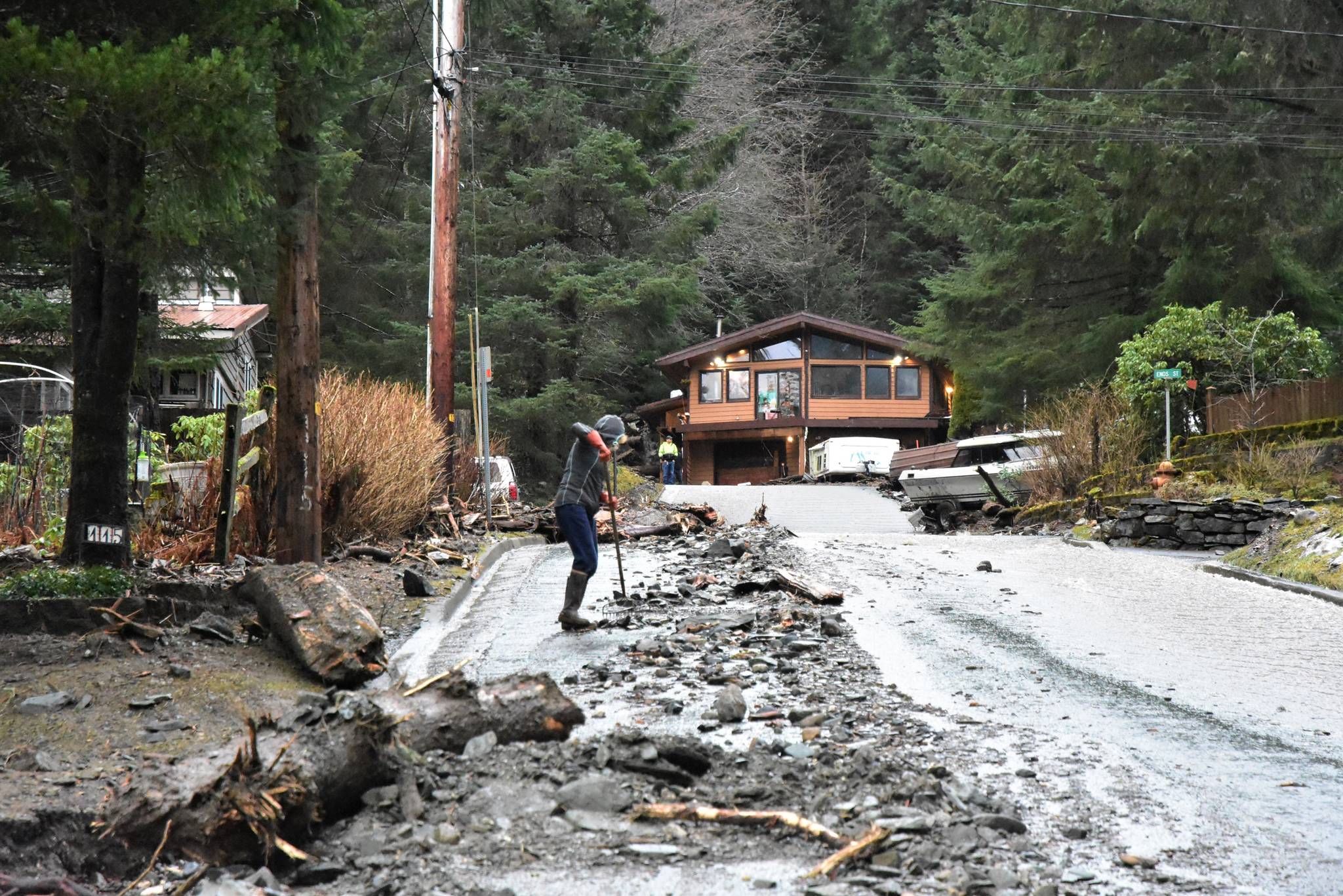The application period to receive disaster relief funds for damages incurred during record-setting storms in early December opened Monday, Jan. 4, and ends Feb. 26, Alaska Division of Military and Veterans Affairs announced.
But because the process for receiving state and federal relief money takes time, state officials are urging affected people to apply as soon as possible, said Jeremy Zidek, spokesperson for the Division of Homeland Security and Emergency Management.
“We want people to apply as soon as they can and start the process,” Zidek said in a phone interview Monday. “The earlier they start that the better off they’ll be.”
[Dunleavy declares disaster for storm-damaged Southeast]
Emergency funds are available for things like temporary housing, he said, but for most other funding, the state is still working with federal and non-governmental partners for relief programs.
People with property damage or financial need caused by the storms may be eligible for state and federal disaster relief, the state emergency management division said in a news release.
“The federal programs can provide twice the amount of funds our state programs,” he said, “but the federal programs can take quite a long time to activate.”
Applications also help state officials identify specific needs and put people in contact with the correct federal grant program or non-governmental organization such as the Salvation Army or Red Cross, Zidek said.
Heavy rains last month caused landslides and flooding across Southeast Alaska, most notably in Haines where two people were lost in a slide that also destroyed several homes. Property was damaged in Juneau, but no injuries were reported.
Gov. Mike Dunleavy declared a state of emergency on Dec. 5, 2020, and later amended the declaration to activate the state’s individual assistance program, according to the division. But what kind of assistance depends on many different factors, Zidek said, and the state is working with federal agencies to identify programs that may become available to disaster survivors.
People impacted by the disaster must pursue federal disaster assistance before the state can award its own individual assistance program, according to the Division of Homeland Security and Emergency Management. Zidek said that means people must be able to show they still have a need that hasn’t been met by a federal program. Even if applicants have received money from private insurance, they may still be eligible for state and federal relief, Zidek said.
“Our state’s Individual Assistance Program is designed to address the critical unmet needs of those impacted by a disaster,” said Paul Nelson, director of DHSEM in the release. “The IA program will be utilized to the fullest, but its limitations mean only the most critical needs of disaster survivors will be considered. It is a publicly funded assistance program, not insurance. The state will pursue every avenue of assistance to help those impacted by this disaster.”
[Heavy rain and mudslides strike buildings, wash out roads]
Residents in the City and Borough of Haines, Municipality of Skagway Borough, City and Borough of Juneau, City and Borough of Wrangell, Petersburg Borough, City and Borough of Sitka, Ketchikan Gateway Borough, Annette Island and Chatham may be eligible for disaster recovery grants for damages to their primary residences that occurred during the 2020 December Southeast Storm, according to DHSEM.
Applicants can register online at Ready.Alaska.gov or by phone at 1-855-445-7131
The state’s individual assistance grants have three parts; temporary housing grants; housing assistance grants and other needs assistance grants, according to DHSEM. Temporary housing can provide funds to secure lodging while applicants pursue permanent housing solutions, and financial assistance may be available for up to 18 months for owners and three months for renters, the release said.
Housing assistance grants can provide funds for damages to primary residences not covered by insurance, but the residence must be owner-occupied at the time of the event, according to DHSEM. The individual assistance program does not help with secondary homes, recreational properties and homes lived in less than six months per year. Damages must be serious and negatively impact the essential living spaces in the home and from the declared event.
Other needs assistance can provide funds for losses to essential personal property not covered by insurance such as clothing, appliances and furniture, DHSEM said, and recovery costs such as clean up and some storage expenses. It may also help with disaster-caused medical or funeral expenses not covered by insurance, the release said.
According to DHSEM, applicants are asked to provide a description of damages and/or losses, homeownership documentation, insurance information, personal identification and proof of occupancy such as a utility bill.
Read an individual assistance fact sheet below:
• Contact reporter Peter Segall at psegall@juneauempire.com. Follow him on Twitter at @SegallJnuEmpire.

